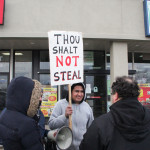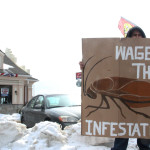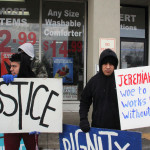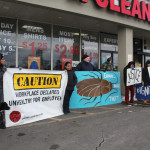Immigrants’ rights activists stood with signs outside two businesses in Orange and West Haven yesterday afternoon, condemning the alleged wage theft and abuse of Latino workers Armando Rodriguez and Alberto Saldana.
Most of the protesters were members of Unidad Latina en Accion, a New Haven-based immigrant’s rights organization. The protest started at A Cleaners in Orange, where Rodriguez worked for six years before quitting and was paid below the minimum wage. It then moved to A-1 Diner in West Haven, where Saldana was allegedly fired after requesting his overtime wages, which summed to nearly $2,000. Although the owners of the two businesses dispute the wage theft allegations, multiple protestors and an attorney said the protests demonstrate that Latino immigrants are more likely than other populations to suffer from unfair labor practices.
“Wage theft is not limited to immigrant workers or low-wage workers by any means, but those groups are particularly vulnerable,” said attorney Christopher Marlborough, who specializes in wage theft.
Rodriguez claims that his boss — Charles Jung, who owns A Cleaners —owes him $16,662 in unpaid wages. From May 2009 to June 2014, Rodriguez said, he worked 77 hours a week on average at $7.50 per hour. Connecticut’s minimum wage is $8.70.
Rodriguez also said Jung beat him in June 2014. The resulting injuries required a trip to the emergency room and an overnight stay in the hospital, both of which were paid for by Jung. Jung was arrested nearly a month later on Aug. 12 and was given two years of probation for the beating.
The morning of the protest, ULA member John Lugo received a phone call from Jung’s lawyer formally offering Rodriguez $5,000 compensation for unpaid work. Luis Luna, a member of ULA, said he sees this monetary offer as a victory for his organization.
Karim Calle, an active member of ULA, expressed more skepticism, explaining that this offer does not come close to covering the full $16,000 Rodriguez is owed.
Calle emphasized that ULA does not make money from acting on behalf of victims of wage theft, and that they prefer negotiation to protest.
“We really don’t want to be this scandalous, but we really don’t have any other choice but to come out and protest,” Calle said.
After spending a half-hour outside A Cleaners, the protesters drove to the nearby parking lot of A-1 Diner. ULA protested on behalf of Saldana, who had been working 60-hour weeks at the diner and who claims he was not compensated for working during his one-hour lunch break each day.
George Tsiorvas, the general manager of A-1 Diner, told the News he does not owe overtime pay to Saldana since employers are required by law to provide lunch breaks. Tsiorvas added that Saldana often failed to show up to work and had rejected the $600 and summer employment he had offered Saldana at a meeting in his office on Tuesday.
Tsiorvas threatened to call the police if the protestors did not leave his property within five minutes.
Marlborough sided with Saldana in this case. As long as an employer is aware that an employee did not take a designated break, the employee has a right to overtime wages, Marlborough said.
“If he knows that people are working through the break, he’s stealing their money,” Marlborough said. A private or class action lawsuit against an employer over wage theft can win up to twice the amount of the wages owed.
Marlborough said there are currently no laws protecting immigrant employees from wage theft, but more attorneys general have begun to take the issue seriously.
Calle said she hopes these protests will encourage more Latinas to speak out against unfair labor practices.
By state and federal law the employers are liable to pay the workers two years of unpaid minimum and overtime wages.














